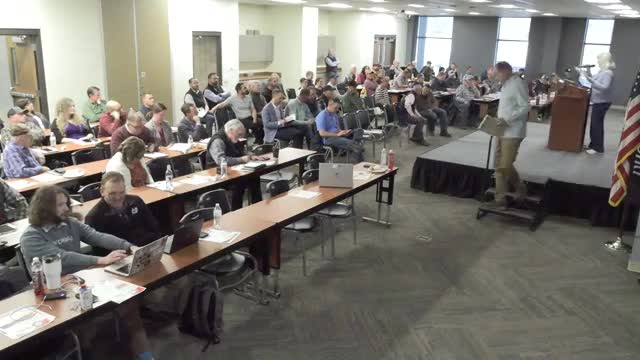Local lawmakers, regulators outline bills affecting technical colleges, carbon storage and road-impact funds
Get AI-powered insights, summaries, and transcripts
Subscribe
Summary
Representative Christine Watkins and Senator Kevin Winterton briefed the Uinta Basin Collaborative on 2025 legislation affecting technical-college planning and funding, geologic carbon-storage authority, and a three-year severance surcharge to fund local road impacts.
Representative Christine Watkins and Senator Kevin Winterton addressed the Uinta Basin Collaborative and summarized 2025 legislation and related rulemaking that affect technical colleges, carbon storage regulation and local road-impact funding.
Watkins said lawmakers amended statute to let technical colleges complete planning and design work before seeking legislative approval for capital projects and to address an identified funding inequity for rural technical college students who often remain in high school while participating in technical programs. "We changed that so that they could plan and get drawings and get everything ready for it before they come to the legislature," Watkins said.
Watkins also described geologic carbon storage amendments and a statutory route for the Division of Oil, Gas and Mining to obtain state primacy for Class VI carbon injection permitting. She said the new law provides the board authority to impose civil and criminal penalties required by EPA for primacy. She referenced prior direction in 2022 (House Bill 244) and said a 2025 follow-on bill (House Bill 352) helped complete the primacy pathway.
For local infrastructure funding, Watkins described a three-year local road-impact severance surcharge: "So it's 5¢ a barrel of oil or, 5¢ or a quarter cent on natural gas," she said. She said counties must justify road spending at the end of the three years and that the program is time-limited.
Senator Winterton and other speakers also described bills dealing with mineral-rights valuation when state land or rights-of-way are acquired, and legislation intended to encourage advanced electric-transmission technologies.
Natasha Baliff, the division27s legislative and policy coordinator, updated the group on rulemaking. She said the division finalized a recycling-facilities rule effective Feb. 26 and is transferring permit work to the Division of Waste Management and Radiation Control. Baliff said the division had posted draft bonding rule language and that the Utah Petroleum Association planned to present edits; she said a Class VI carbon-sequestration rule was being finalized for formal board consideration in May and noted a separate rulemaking for deep brine wells under House Bill 478.
Ending: Organizers said they would continue to circulate legislative and rulemaking updates to stakeholders and noted additional county and collaborative meetings scheduled through the year.
